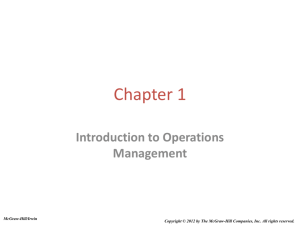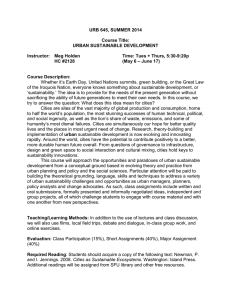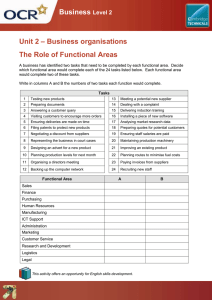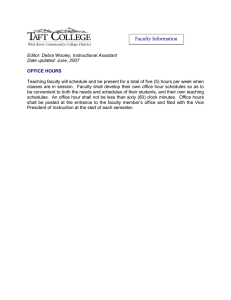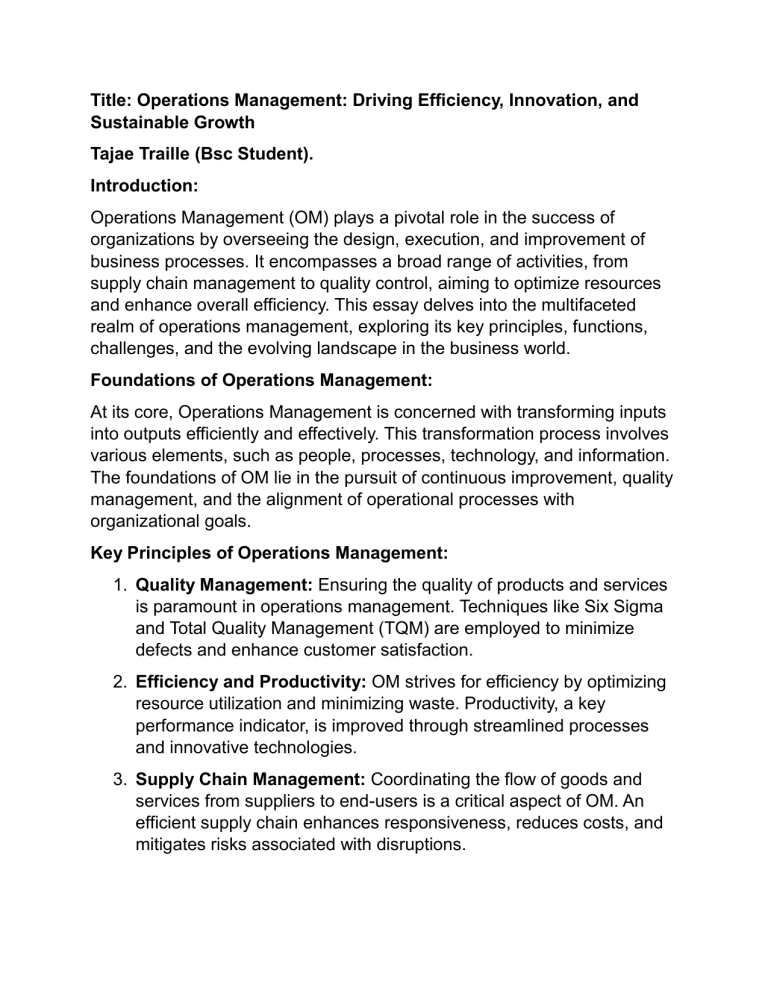
Title: Operations Management: Driving Efficiency, Innovation, and Sustainable Growth Tajae Traille (Bsc Student). Introduction: Operations Management (OM) plays a pivotal role in the success of organizations by overseeing the design, execution, and improvement of business processes. It encompasses a broad range of activities, from supply chain management to quality control, aiming to optimize resources and enhance overall efficiency. This essay delves into the multifaceted realm of operations management, exploring its key principles, functions, challenges, and the evolving landscape in the business world. Foundations of Operations Management: At its core, Operations Management is concerned with transforming inputs into outputs efficiently and effectively. This transformation process involves various elements, such as people, processes, technology, and information. The foundations of OM lie in the pursuit of continuous improvement, quality management, and the alignment of operational processes with organizational goals. Key Principles of Operations Management: 1. Quality Management: Ensuring the quality of products and services is paramount in operations management. Techniques like Six Sigma and Total Quality Management (TQM) are employed to minimize defects and enhance customer satisfaction. 2. Efficiency and Productivity: OM strives for efficiency by optimizing resource utilization and minimizing waste. Productivity, a key performance indicator, is improved through streamlined processes and innovative technologies. 3. Supply Chain Management: Coordinating the flow of goods and services from suppliers to end-users is a critical aspect of OM. An efficient supply chain enhances responsiveness, reduces costs, and mitigates risks associated with disruptions. 4. Capacity Planning: OM involves forecasting demand and aligning production capabilities to meet it. Effective capacity planning ensures that organizations can fulfill customer requirements without overburdening resources. Functions of Operations Management: 1. Design of Goods and Services: This function involves creating products or services that meet customer needs. OM professionals collaborate with product designers and engineers to ensure that the end result is both feasible for production and desirable for the market. 2. Process Management: OM focuses on optimizing processes to enhance efficiency. Techniques like process mapping and analysis help identify bottlenecks, redundancies, and areas for improvement. 3. Quality Management: Quality is not just a product of inspection; it is built into the process. OM professionals use statistical methods and quality control tools to monitor and improve processes, ensuring consistent and high-quality outputs. 4. Supply Chain Management: The globalized nature of business has made effective supply chain management indispensable. Operations managers coordinate with suppliers, manufacturers, and distributors to create a seamless flow of goods and services. 5. Inventory Management: Balancing the costs of holding inventory against the costs of stockouts is a delicate task. OM involves optimizing inventory levels to ensure products are available when needed while minimizing holding costs. 6. Scheduling: OM professionals develop schedules to coordinate various activities within an organization. This includes production schedules, employee schedules, and maintenance schedules, among others. Challenges in Operations Management: 1. Globalization: Operating on a global scale introduces complexities related to cultural differences, regulatory requirements, and logistics. OM must adapt to these challenges to maintain a competitive edge. 2. Technology Integration: The rapid evolution of technology presents both opportunities and challenges. Integrating new technologies, such as artificial intelligence and automation, requires careful planning to ensure a smooth transition and optimal performance. 3. Supply Chain Risks: Events like natural disasters, geopolitical tensions, and pandemics can disrupt the supply chain. Operations managers need to develop strategies to mitigate these risks, such as diversifying suppliers and creating contingency plans. 4. Changing Consumer Expectations: Consumer expectations are evolving rapidly, with a growing emphasis on sustainability, customization, and rapid delivery. Operations managers must align processes with these changing preferences to remain competitive. The Evolving Landscape of Operations Management: 1. Digital Transformation: The Fourth Industrial Revolution has ushered in a new era of digital transformation. Operations management is leveraging technologies like the Internet of Things (IoT), big data analytics, and cloud computing to enhance visibility, decision-making, and overall efficiency. 2. Sustainability: With increasing awareness of environmental issues, sustainability has become a focal point in operations management. Organizations are incorporating eco-friendly practices into their processes, from sourcing materials responsibly to reducing carbon footprints. 3. Agile and Lean Practices: Traditional hierarchical structures are giving way to more flexible and responsive organizational frameworks. Agile and lean practices, borrowed from software development and manufacturing, are being applied to enhance adaptability and responsiveness in various industries. 4. Collaborative Supply Chains: The emphasis on collaboration extends beyond organizational boundaries. Operations management is increasingly focused on building collaborative supply chains, where partners share information and work together to achieve common goals. Conclusion: Operations management is a dynamic and integral part of organizational success. As businesses navigate an ever-changing landscape, the principles and functions of OM continue to evolve. From ensuring quality to adapting to technological advancements, operations management remains at the forefront of driving efficiency, innovation, and sustainable growth. As organizations continue to face new challenges and opportunities, the role of operations management will only become more crucial in shaping the future of business.
